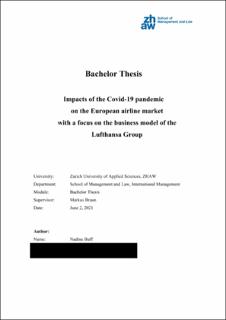Please use this identifier to cite or link to this item:
https://doi.org/10.21256/zhaw-24568Full metadata record
| DC Field | Value | Language |
|---|---|---|
| dc.contributor.advisor | Braun, Markus | - |
| dc.contributor.author | Buff, Nadine | - |
| dc.date.accessioned | 2022-03-16T11:10:03Z | - |
| dc.date.available | 2022-03-16T11:10:03Z | - |
| dc.date.issued | 2021 | - |
| dc.identifier.uri | https://digitalcollection.zhaw.ch/handle/11475/24568 | - |
| dc.description.abstract | The outbreak of the Covid-19 pandemic in December 2019 drastically reduced the demand for air travel and led the airline industry to its worst crisis in history. Various airlines around the world required government bailouts to avoid bankruptcy. While airlines desperately need cash revenues to recover, the demand for air travel as of April 2021 remains low and is expected to reach a maximum of 43% of 2019 levels by the end of 2021. Consequently, airlines have to develop new strategic solutions to cooperate with the occurring challenges and to secure their future existence. The aim of this study was to analyze the impacts of Covid-19 on the European airline market, with a focus on the development of the business model of the Lufthansa Group. To receive an in-depth knowledge of the European airline market and the role of the Lufthansa Group, various literature reviews as well as a survey and different expert interviews were carried out. After an introduction to the Lufthansa Group’s current structure and the impacts of Covid-19 for the airline group, a Porter’s five forces analysis was conducted to gain a better understanding of the competitive landscape of the European airline market. The research showed that the European airline industry is highly competitive, which puts extensive pressure on airlines. In addition, a SWOT analysis allowed scrutiny of the competitiveness of the Lufthansa Group. The analysis revealed that the Lufthansa Group has a strong position in the market with a well perceived image. However, there were also weaknesses discovered which cause challenges for the company and weaken its competitiveness. Examples here for are demanding labor unions or the partial government ownership that occurred during 2020 due to the strong decrease in liquidity. The evaluation of the survey and the expert interviews showed that people are willing to fly again, however, imposed travel and quarantine restrictions are postponing a major restart. Furthermore, there is a high degree of uncertainty across the industry which requires flexibility and makes it difficult to develop reliable predictions. To conclude, the knowledge acquired throughout the literature review as well as the survey and interviews were combined. The findings were applied to the Ansoff’s dimensions of geographic growth vector and a one- and five-year scenario for the business model development of the Lufthansa Group were derived. Specific suggestions for changes were made. It is considered crucial that Lufthansa Group’s airlines recognize occurring travel trends on time and provide customers with the required health and safety measurements to gain back people’s confidence to travel. The recovery and future success of the airline group also highly depends on travel restrictions being lifted. Therefore, the author of this paper recommends comparing the created scenarios with the developments in reality and to conduct further research based on the analyzed reasons for correlations and deviations. In addition, the research may be expanded to other airlines and markets, along with non-passenger cargo flights. | de_CH |
| dc.format.extent | 96 | de_CH |
| dc.language.iso | en | de_CH |
| dc.publisher | ZHAW Zürcher Hochschule für Angewandte Wissenschaften | de_CH |
| dc.rights | https://creativecommons.org/licenses/by-nc-nd/4.0/ | de_CH |
| dc.subject.ddc | 380: Verkehr | de_CH |
| dc.subject.ddc | 658: Allgemeines Management | de_CH |
| dc.title | Impacts of the Covid-19 pandemic on the European airline market with a focus on the business model of the Lufthansa Group | de_CH |
| dc.type | Thesis: Bachelor | de_CH |
| dcterms.type | Text | de_CH |
| zhaw.departement | School of Management and Law | de_CH |
| zhaw.publisher.place | Winterthur | de_CH |
| dc.identifier.doi | 10.21256/zhaw-24568 | - |
| zhaw.originated.zhaw | Yes | de_CH |
| Appears in collections: | BSc International Management | |
Files in This Item:
| File | Description | Size | Format | |
|---|---|---|---|---|
| Bachelorarbeit Nadine Buff.pdf | 8.94 MB | Adobe PDF |  View/Open |
Show simple item record
Buff, N. (2021). Impacts of the Covid-19 pandemic on the European airline market with a focus on the business model of the Lufthansa Group [Bachelor’s thesis, ZHAW Zürcher Hochschule für Angewandte Wissenschaften]. https://doi.org/10.21256/zhaw-24568
Buff, N. (2021) Impacts of the Covid-19 pandemic on the European airline market with a focus on the business model of the Lufthansa Group. Bachelor’s thesis. ZHAW Zürcher Hochschule für Angewandte Wissenschaften. Available at: https://doi.org/10.21256/zhaw-24568.
N. Buff, “Impacts of the Covid-19 pandemic on the European airline market with a focus on the business model of the Lufthansa Group,” Bachelor’s thesis, ZHAW Zürcher Hochschule für Angewandte Wissenschaften, Winterthur, 2021. doi: 10.21256/zhaw-24568.
BUFF, Nadine, 2021. Impacts of the Covid-19 pandemic on the European airline market with a focus on the business model of the Lufthansa Group. Bachelor’s thesis. Winterthur: ZHAW Zürcher Hochschule für Angewandte Wissenschaften
Buff, Nadine. 2021. “Impacts of the Covid-19 Pandemic on the European Airline Market with a Focus on the Business Model of the Lufthansa Group.” Bachelor’s thesis, Winterthur: ZHAW Zürcher Hochschule für Angewandte Wissenschaften. https://doi.org/10.21256/zhaw-24568.
Buff, Nadine. Impacts of the Covid-19 Pandemic on the European Airline Market with a Focus on the Business Model of the Lufthansa Group. ZHAW Zürcher Hochschule für Angewandte Wissenschaften, 2021, https://doi.org/10.21256/zhaw-24568.
Items in DSpace are protected by copyright, with all rights reserved, unless otherwise indicated.